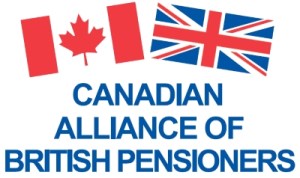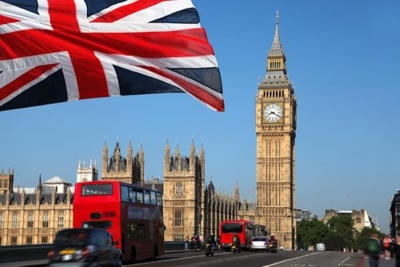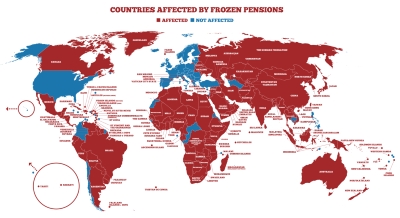
Photo of Anne Puckridge by her daughter, Gillian
Nigel Nelson is a regular contributor to Brits in Toronto, and is a member of the non-profit Canadian Alliance of British Pensioners (CABP), and Past Chair of the (also) non-profit International Consortium of British Pensioners (ICBP).
Here’s his latest thoughts on the “frozen pensions” policy. All views are the CABP’s and Brits in Toronto does not endorse them and is not held liable in any way. As always, do your due diligence.
As regular readers of this column will know, I have a good friend, James (real person but name changed) who is a doting pensioner in his eighties. If I had to describe James, it would be curmudgeonly, but recently he has an almost sickly smile on his face and he is … humming (not exactly in tune, but humming nevertheless), and here is the reason why.
By way of background and, according to the latest figures from the Department of Work and Pensions (DWP), there are just over 132,000 UK pensioners living in Canada who are in receipt of a UK State Pension. The average amount received by each of these pensioners is just £42.65 per week, or, based on today’s exchange rates, $71.22 a week — some are receiving as little as £20 per week.
By contrast, there are 11.6 million pensioners in the UK and they receive an average of £145.57 per week; admittedly, there are one of two benefits (such as the disability allowance) that are included in the UK figures that UK pensioners living in Canada are not entitled to. But, as you can see, there is a huge discrepancy between the average weekly amounts received based on where you decide to retire to.
Once a pensioner decides to retire to Canada from the UK their UK State Pension is “frozen” at the level first received here. This is known as the UK “frozen pension” policy which has been in existence for over 70 years. In James’s case, he has received nearly £28,000 (over $51,000 using historic exchange rates) less than he would have received if he had remained in the UK.
James lives in Ontario, and, if he had decided to retire south of Niagara Falls (in the US), he would have continued to receive the annual increases to his UK State Pension, but, by living North of the Falls (in Canada), then he does not receive the annual increases — how can that be fair, on any level?
Anyway, today’s story is not about James, but about another of my friends: Anne Puckridge, whose picture is above.
Anne is 93 years old, and she is a former college lecturer. She lived and worked in the UK for 40 years, paying mandatory National Insurance contributions throughout this time. In 2002, aged 77 she finally retired and decided to move to Canada to be with her daughter, Gillian, and grandchildren who had moved to Calgary in the 1990s.
Sixteen years on, Anne, who served as an intelligence officer in the Women’s Royal Navy in the Second World War, is struggling to live on the frozen £72.50 a week rate she was entitled to when she moved abroad. Anne has received around £22,000 less than if she had stayed in the UK, and, in my article in August, I highlighted the fact that Vic Williams, who passed away earlier this year at the grand old age of 96, had received £67,000 (over $129,000) less than his peers in the UK.
Anne now feels that she will be forced to move back to Britain, because her pension will no longer cover day-to-day expenses and she is increasingly reliant on her daughter to get by.
“It’s the small things, and the injustice, that is really getting to me. I value my independence, but I can’t go on living on the breadline and I don’t want to inflict this on my family. As well as ever-increasingly poverty, I feel a sense of stress and shame, which is affecting my health,” she says.
Anne used to be able to go out to lunch and afternoon tea with her friends, but now she must weigh up the cost of this versus spending the same money on Christmas gifts for her grandchildren.
Last year, in a debate in the UK House of Commons on Pensions Uprating, when referring to Anne, Mhairi Black, MP, Scottish National Party had this to say:
“We are saying, ‘We’re not going to give you that money, but you can go and live abroad, make yourself ill through poverty, worry and the stress of having to come home. When you are forced to return to Britain, don’t worry, we’ll foot the bill for the NHS and everything else.’ The argument about cost does not stand up — costs will increase when pensioners who have been made ill through stress or whatever, have to come back in order to survive.”
The cost to uprate the State Pension worldwide has been estimated by the UK Government to be £600 million, and that the country cannot afford it. However, what they forget to tell you is:
1. According to the Office of Budget Responsibility (OBR), each pensioner living outside the UK saves the Treasury around £1,500 per pensioner per year. There are 1.2 million UK pensioners living overseas. This means that the UK Government is saving £1.8 billion off the backs of the most vulnerable people in society today – pensioners.
2. All National Insurance Contributions are paid into the National Insurance Fund (NIF), and the State Pension is paid out of the same fund. According to the latest set of NIF accounts (year ended March 31, 2018), there is currently a balance of £24.2 billion (page 13) in the NIF. By law, there must be a “running balance” (or “float”) equal to 1/6th of the Annual Payments from the NIF account (£101.5 billion) which is £16.9 billion, which then leaves an excess of £7.3 billion. Why can the uprating amount of £600 million come from this account? It is also interesting to note that the excess has grown by over £2 billion in the past 12 months. As an aside, this balance of £24.2 billion is used as a UK National Debt offset, rather than distribute it to those who are in most need.
So, when the UK Government says that they cannot afford it, what they are really saying is that the over 520,000 UK pensioners living in “frozen” countries like Canada and Australia aren’t worth it, even though many, like Anne, fought for their country. In addition, because UK pensioners living in this country do not receive the annual increase, the Canadian government is subsidizing the UK government by providing the extremely poor with cash and housing benefits, which is coming out of taxes you and I pay. In addition, it has been estimated that because these pension increases are not being received by UK pensioners living in Canada, it is costing the Canadian economy more than half a billion dollars a year since, typically, pensioners are spenders and not savers.
Just these past few days, Anne and her daughter Gillian have flown to the UK. The International Consortium of British Pensioners (ICBP), which is half owned by the Canadian Alliance of British Pensioners (CABP) has recently set up a new petition, where Anne is our campaign “poster girl.”
If you are a “frozen” pensioner, or if you hope to receive a UK State Pension one day, I would ask you to please check out this petition, add your own name to it, and send the link to everyone in your contact list, both here in Canada and in the UK; this is a global issue. So far, the petition has attracted 218,000 signatures and Anne will be on hand in the Palace of Westminster to answer questions that MPs may have. At the same time, the Chairman of the ICBP will be presenting the petition to 10 Downing Street.
Anne has had a lot of attention recently (which she absolutely hates!), as articles have appeared on both sides of the pond. In the UK, the FT Adviser wrote an article, as did The Guardian and Daily Express, and here, in Canada, the BBC (USA and Canada) and the CBC both have articles on their websites, and there is also an article in the International Adviser.
In addition, Brits in Toronto (hello!) and emigrate.co.uk have also picked up the story.
If there are any questions you have relating to the UK State Pension, you can call the CABP toll-free on 1 888 591 3964 or contact info AT britishpensions DOT COM.



















